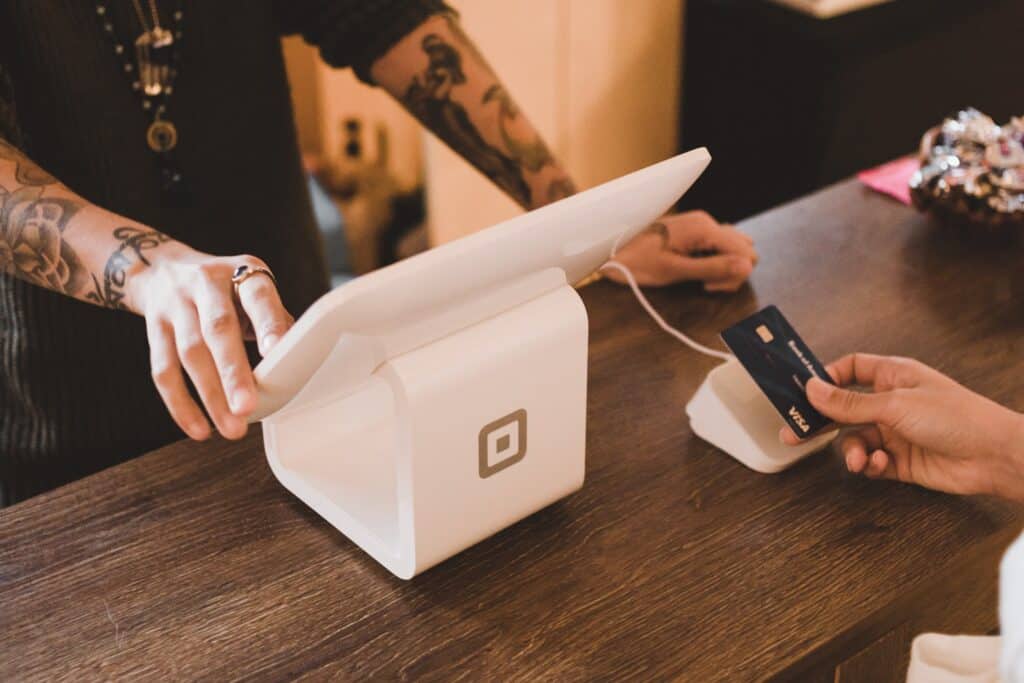🎉 Tillful is now part of Nav! Compare business credit cards at Nav
Secured credit cards can seem quite similar to prepaid cards and debit cards. However, they are a unique type of credit-building credit card that are actually more similar to unsecured credit cards (what you may be familiar with as “regular” credit cards). Here’s everything you need to know about secured cards, and how to use them to build business credit.
In this article:
- What is a secured credit card?
- If you have to put down the money to set the credit line, then why is it considered a credit card?
- How the deposit works for secured credit cards (hint: it’s not a form of payment)
- Typical deposit requirements
- Interest rates and other fees for secured credit cards
- How to choose a secured credit card
- How to get approved for a secured credit card
- How to build business credit with secured credit cards
- Graduating from secured to unsecured credit cards
What is a secured credit card?
A secured credit card is one that requires a cash deposit in order to set the credit line, and thus, open the credit account. Other than that, this type of credit card is the same as a “regular” (or unsecured) one.
Secured cards are typically easier to get for businesses that have limited business credit history, or that have bad credit. These types of businesses are often considered “risky” by credit card providers, which can lead them to getting denied for unsecured credit cards. For this reason, secured cards are often used to build credit.
Learn more about the differences between secured vs. unsecured credit cards
If you have to put down the money to set the credit line, then why is it considered a credit card?
This is a great, and very common question. Technically, the credit card issuer is deciding to lend to you when they approve you for a secured credit card. Put another way: you’re borrowing money when you use a secured credit card. However, instead of the creditor outright approving you for a credit limit, they hold a security deposit as collateral.
What’s collateral? Collateral is an asset that is pledged to a lender by a borrower in the event that the borrower can’t repay what they owe. It can take the form of cash, property, a truck, or piece of equipment, to name a few examples. Your security deposit is a form of collateral. Secured credit cards will almost always require a cash deposit.
How the deposit works for secured credit cards
Paying your refundable security deposit is required before you can open your secured credit card account and start using your card. Note that spending money on your card does not draw down your deposit; it draws down your credit line. In other words, your deposit is not a prepayment towards your balance. We’ll get more into this below.
In the event that you close your account, your security deposit typically gets refunded. This is the same for if you were to be upgraded to an unsecured credit card (more on upgrades later).
Your deposit is not a form of payment; you must pay your balance
Putting your deposit down does not mean that you’ve prepaid your credit card balance. A secured credit card is not the same as a prepaid card, nor is it similar to a debit card, which is attached to a bank account. You still need to pay off your minimum balance each month, just as you would with a traditional credit card.
If you do not pay your balance as outlined in your card agreement, then you could get hit with extra fees, as well as negative marks on your business (and sometimes personal) credit reports. Since secured credit cards are all about credit building, this is not ideal.
Some examples of consequences for not paying your secured credit card bill include:
- 30, 60, or 90 day past due marks
- Account closure
- Late payment and other penalty fees
- Accumulated interest
- Inactivity fees
In addition, if you fail to make payments by their due dates, your credit card could get closed and marked as delinquent. This too will be reported on your business (and potentially personal) credit reports. In addition, you will likely lose your entire security deposit.
How deposit refunds work
To qualify for a deposit refund, you often need to have your account be in good standing with the credit card company. That means that you should have no outstanding balance, and not be in violation of any of the card terms and conditions.
Deposits typically get refunded at account closure. You can initiate an account closure, or your card account can get upgraded to an unsecured one. Both count as closures.
Typical deposit requirements
Deposit amounts for business credit cards can start anywhere from $500 to $2,000, and can range up to $100,000 (or even higher). Usually, the security deposit amount will be equivalent to the credit limit on your secured card, although policies differ between financial institutions.
Sometimes, the required security deposit is slightly more than your credit limit. For example, an issuer could require a deposit of your desired credit limit plus 1%.
In almost all cases, you must make your security deposit payment and have the ACH clear before you can begin using your credit card. You can also usually raise your credit limit over time by depositing more funds. Again, note that increasing your credit limit does not count as a credit card payment.
Interest rates and other fees for secured credit cards
Typical interest rates and how they stack up
If the secured credit card allows you to carry a balance, then it will charge interest. Interest rates on secured credit cards tend to be on the higher end. This is because businesses that can only qualify for secured cards tend to have poor credit, and therefore be higher risk customers for lenders than others.
For example, the Bank of America Business Advantage Unlimited Cash Rewards Secured credit card comes with a 27.99% variable APR (at the time of this writing). This is about 5–13% higher than the average APR for business credit cards in 2021.
Many fintech cards, including the Tillful Card, don’t allow you to carry a balance. They are similar to charge cards in this way. If your secured credit card requires you to pay the balance in full at the end of every billing cycle, then it likely won’t have any interest charges.
Common other fees
Secured credit card fees can vary widely from provider to provider. However, some may come with annual fees, and/or a few extra fees that can be hidden in the fine print. For example, some Wex fleet cards come with fees for activation, monthly service, and inactivity.
Be sure to read the terms and conditions before activating your card! It’s never nice to have surprise fees hit your monthly bill.
How to choose a secured credit card
Although there aren’t too many secured credit cards for business available on the market, there are still some questions you can ask while doing your research. Here are a few features you may want to consider.
Make sure it reports to the business credit bureaus
The most important feature you should look for in a secured business credit card is that it reports to the business credit bureaus (Experian, Equifax, and Dun & Bradstreet). Many “secured business credit card” roundups online include personal credit cards (like Discover) that don’t help you build business credit. Buyer beware!
Keep in mind that some cards may report to the major credit bureaus for personal credit (Experian, Equifax, and TransUnion) as well. You should take note of whether that’s a feature you want.
Can you afford the security deposit?
In addition, take a look at the minimum deposit requirement. Can you afford it? If you can’t, you may want to look for a card that has a lower requirement, or wait to apply for when your budget allows.
Does the card come with a rewards program?
Most secured credit cards come with limited perks and rewards programs for cardholders. However, if you can get 1% back in rewards or cash back for a particular card, then you may want to consider choosing that one over a card with zero rewards.
Is the card accepted where you spend the most?
Maybe you can only use the card for gas, but you don’t own a fleet. In a case like this, that card might not be the best choice. Similarly, check to see if it’s a Visa, Mastercard, or American Express card. These providers are accepted in most places across the US.
Does the credit card provider have other cards you’d like to upgrade to?
Another factor to consider when choosing a secured credit card is whether the credit card company has other cards you’d like to upgrade to in the future. Going for their secured card option can be a smart way to establish a working relationship.
Are you actually going to use the card?
Don’t apply for cards just to collect them “for business credit.” If you don’t use a card, then you may have gotten a credit inquiry on your credit report for no reason! Plus, if you don’t use your credit card, then it won’t do as much for your payment history or credit score. With the Tillful Card, for example, we don’t report usage unless you make payments (ie, use the card). Other companies may have similar reporting policies.
How to get approved for a secured credit card
Route one: Apply directly
You can apply directly for the secured credit card. In most cases, you’ll get approved, so long as the credit card provider can verify your business exists, and that you are the owner.
Here are some additional tips to ensure you can get approved:
- Make sure all your information matches official documentation. For example, make sure that you’re inputting your business address and legal name as they appear on your official documents.
- Don’t operate in a restricted industry. In most cases, this includes the cannabis, gambling, and adult entertaining industries. It could also include credit repair or financial services. If the list is provided, you can check before you apply.
- If the credit card provider checks personal credit, then unfreeze your credit reports. If the lender can’t perform a credit check, then they’ll deny you.
Route two: Apply for an unsecured credit card first
In some cases, credit card companies won’t advertise that they offer secured credit cards. However, if you were to apply for an unsecured credit card and get denied, then they may offer you a secured credit card instead.
If this happens to you, then in most cases, all you’ll need to do is activate the secured card by making your security deposit. Often, in a year or so, the provider will offer to upgrade you to the unsecured credit card you originally applied for.
How to build business credit with secured credit cards
To build business credit with secured credit cards, be sure that you’re making at least your minimum payment on time or early. It’s also a good idea to keep your credit utilization around 30%. You can do this by paying attention to your spending, or by raising your credit limit. By raising your credit limit, but keeping your spending steady, you can increase your available credit, which decreases your utilization.
Also note that the longer you have your credit card open, the more weight it will have on your credit report. It’s generally a good idea to keep your credit card open for at least one year.
By following these steps, you can ensure that your secured credit card is working to help you build a good business credit score. If your secured credit card reports to the consumer credit bureaus in addition to the business credit bureaus, then proper usage should also boost your personal credit.
Graduating from secured cards to unsecured cards
One of the main points of having a secured credit card is to build good credit and eventually graduate to bigger and better financial products. To do so, you will need to demonstrate responsible card use.
If you’re following the best practices listed above, then that should be enough to show responsible use. By making on-time payments and keeping your utilization low, you can establish a good working relationship with your credit card provider. These two habits will also help you improve your business credit score, making you a better candidate for unsecured credit cards (and other funding products as well).
With that, let’s get into how to upgrade from a secured credit card to an unsecured one.
In-network graduation
If you like the credit card offerings that your secured card provider has, then consider upgrading your card with them. Often, the credit card company will reach out to you directly after about a year offering to upgrade your account. They may even pre-approve you for a credit line.
You can also take the initiative to call the credit card company and ask to upgrade. It’s best to wait at least six months before doing so, but it never hurts to ask!
Out-of-network graduation
If you’ve used your secured credit card responsibly for at least six months, then your business credit score should have improved. Note again that the longer you have your card open, the more weight it will have on your credit.
If your credit card provider doesn’t provide an option to upgrade, or if you don’t like the credit cards they offer, then you can look to apply for an unsecured credit card with another provider. Upgrading with a different company can be a bit harder than doing so in-network. However, if you’re looking at a good credit score, then go for it!
Last word on secured credit cards
It’s a good idea to view secured credit cards as “practice credit cards.” They’re designed to help you build business credit, so take advantage of them to practice paying on time and keeping your utilization in that 30% safe zone. Then when you’re ready, upgrade to an unsecured credit card, and keep those habits going!


